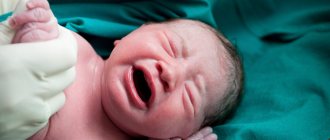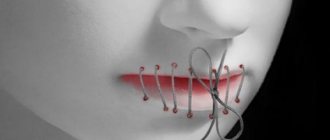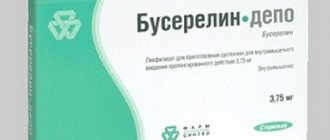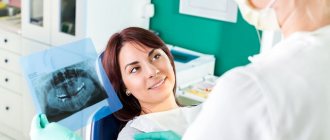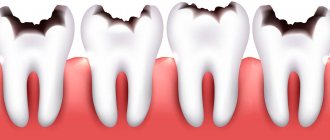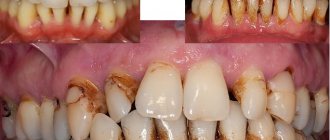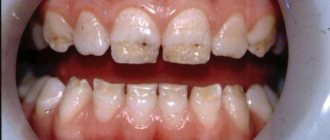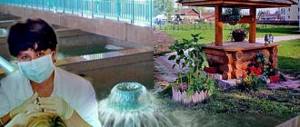Tapping and grinding teeth is a habit for many. A clenching of the jaw can be observed in an angry person, and in attempts to concentrate and remember something there will be a characteristic movement of the jaws and the same grinding. There is nothing wrong with periodic teeth grinding, but for 10% of the population this phenomenon is not a habit, but a symptom. Bruxism is a paroxysmal contraction of the masticatory muscles that occurs during the day or night. This is a disease that is not controlled, as during stress and anxiety, the muscles involuntarily contract, a grinding noise occurs with a characteristic sound. To this day, the correct cause of this phenomenon has not yet been established, but attempts to treat it are being successfully made. Night bruxism in adults is not a harmless disease; frequent teeth grinding leads to changes in the mandibular joint and abrasion of the enamel. Joint dysfunction leads to painful spasms.
Bruxism is more common in adult women and is associated with mild disorders of the central nervous system. Minor stress instantly triggers a protective mechanism such as teeth grinding.
People of certain professions, for example, surgeons or watchmakers, may experience bruxism.
When you need to concentrate on working with small details, that same grinding noise begins. Immediately after installing the filling, you can also observe teeth grinding, but this is an attempt to adapt the teeth to each other, and not a disease.
How to separate a common habit and a disease? There is one condition that determines that teeth grinding is pathological - it begins involuntarily and cannot be controlled by a person.
The harmful effects of the disease
At the first symptoms of bruxism, you should consult a dentist. The cause of the disease does not necessarily lie in the oral cavity, but it is the teeth that receive the maximum damage during the course of this disease. The sound that a person suffering from bruxism makes is a consequence of the tightly closed jaws not standing still, constantly trying to change their position. Accordingly, tooth friction occurs, which leads to a number of terrible consequences.
- Increased sensitivity. Enamel is the protective covering of the tooth, one of the functions of which is thermoregulation. Thanks to this feature, an ordinary person does not feel almost anything with his teeth, while with increased sensitivity, any meal or inhalation of cold air through the mouth brings a lot of unpleasant sensations.
- Reduced tooth lifespan. A person’s teeth should serve him until old age, if all the rules of hygiene and proper nutrition are followed, but not all teeth survive into old age. Some are lost during injury, but most either fall out on their own or have to be removed surgically. This happens due to damage to the oral cavity by diseases. The most common is caries. It is diagnosed in different ways at different stages, but it all starts with carious bacteria. Enamel damaged by bruxism easily allows pathogenic bacteria into the “heart” of the tooth, from where they cannot be removed by regular teeth brushing. Bacteria eat the tooth from the inside, so instead of the required decades, it can last only a few years.
- Loose teeth. Teeth are not a constant, they are a movable element of the jaw, and it is thanks to this characteristic that a bite can be corrected at any age. However, with constant attacks of bruxism, the teeth become more mobile, and the gums are injured as a kind of attachment. Injury to the gums most often occurs at the junction of the teeth, so the tooth becomes vulnerable to external infections and bacteria.
- Rapid wear of orthopedic structures. Not only natural teeth suffer from grinding, but also implants, as well as various structures for changing the bite. Braces pose a particular danger. A metal structure can damage the soft tissues of the oral cavity during an attack of bruxism, so it is necessary to cure this disease before installing quickly wearing dentures or other orthopedic structures.
In addition to problems with the oral cavity, bruxism is accompanied by serious sleep disturbances, which is fraught not only with constant fatigue and irritability, but also with an increased risk of sleep apnea. But even without this, lack of sleep has a very bad effect on a person’s psychological and physical state, so bruxism requires mandatory treatment under the supervision of specialists.
Caries - causes, prevention. How to brush your teeth correctly? Detailed instructions with Video! Teeth whitening at home is the most effective means.
Diagnostics
A preliminary diagnosis is established based on complaints from the patient and his close relatives. In addition, the dentist conducts an external examination of the oral cavity to establish indirect signs.
One of the effective ways to diagnose bruxism is the use of special brux checkers. These are mouth guards made from casts of a jaw model. Thanks to them, the specialist is able to determine the presence of occlusive obstacles that can cause grinding.
They are worn for one night and then sent for analysis, where the dentist determines which groups of teeth are under stress. Electromyography or polysomnography is also prescribed.
In certain cases, to establish the causes of the pathology, consultation with a neurologist, gastroenterologist, psychologist or otolaryngologist is required. Based on diagnostic data, a treatment regimen is determined.
Principles of treatment of bruxism
Getting adequate sleep helps eliminate the negative effects of stress, which is an important component of treating bruxism.
Teeth grinding, which occurs in childhood, is infrequent, short-term, does not cause damage to the teeth, in most cases does not require medical intervention and goes away on its own as the child grows older. If a child experiences bruxism day after day for months or even years, this condition requires the help of a dentist.
To help the patient normalize his psycho-emotional state, he may be recommended to work with a psychologist.
A separate part of the treatment of bruxism is dental correction. To prevent damage to tooth enamel due to grinding, the patient will be advised to wear a mouthguard. The principle of their manufacture and use for the purpose of diagnosing bruxism is described above, but in addition to diagnosing, mouth guards are also used in the treatment of this disease. The dentist will also perform manipulations aimed at eliminating malocclusion, replacing missing teeth with dentures and other necessary actions.
In especially severe cases, when the therapeutic measures described above do not have the desired effect, the patient may be prescribed Botox injections, which paralyze the mouth muscles, as well as hypnosis.
What is nocturnal and daytime bruxism and what are its symptoms?
Bruxism is a specific sound, grinding, that occurs during sleep as a result of clenching the jaws. In this case, the chewing muscles involuntarily contract to such an extent that the jaws begin to move unnaturally and the teeth begin to rub.
Bruxomania - attacks of teeth grinding in a conscious state
If teeth grinding occurs during the day, while you are awake, this phenomenon is called bruxomania .
Symptoms of Bruxism:
- the grinding noise is noticed by loved ones, but the person himself does not wake up from it
- causeless toothache
- jaw pain
- dizziness
- drowsiness
- headache
- ringing in the ears and head
- teeth are worn out
- Cracks and chips appear on the tooth enamel
- inflammation of the gums
- tooth loss (looseness)
- destruction of dentures, crowns, loss of fillings
IMPORTANT: If a person suffers from bruxism or bruxomania for a long time, he may develop pathologies in the oral cavity (fibroids, lichens, abrasions).
Ringing in the ears and head - signs of bruxism
Classification
Doctors distinguish two classifications of bruxism - by the time the symptom appears and by its volume. In the first case we are talking about such types of disease as:
Night
Most often found in medical practice. This is a condition that occurs when a person loses control over muscle activity. One attack lasts from several seconds to a minute. The number of manifestations of bruxism during the night is not limited. The danger of nocturnal odonterism lies in the fact that the patient himself discovers it only by additional symptoms or by observations of relatives.
Day
It appears when speech is a congenital or acquired long-term pathological condition, for example, dental malocclusion. The first stage of the disease often goes unnoticed because it does not interfere with the normal functioning of patients. Its manifestations include the habit of biting a pencil or nails during stress. In some cases, such symptoms develop into full-fledged odonterism, requiring treatment, but the mild daytime form goes away on its own when nervous balance is restored.
Based on the noise level, bruxism occurs:
Quiet
It is characterized only by clenching of the teeth and is rarely noticed even by the patient’s relatives. Often people with such odonterism experience enamel problems that are not justified by other factors.
Noisy
Characterized by grinding of teeth during compression. It is clearly audible to strangers and manifests itself in the deformation of the natural shape of the teeth. It is easy to detect if the sick person has observant relatives, and with timely treatment, significant dental problems will not arise. But if the patient lives alone and is unaware of his condition, then noisy bruxism can be even more dangerous than quiet bruxism.
Prevention of bruxism
Bruxism is a phenomenon that cannot be predicted. However, given the combination of factors that cause it, bruxism is highly likely to appear.
Therefore, it is important to carry out simple prevention of bruxism in advance, which consists of:
- normalization of psycho-emotional state
- avoiding stressful situations
- self-relaxation training
- getting rid of bad habits
- timely quality dental treatment
Timely dental treatment is one of the methods for preventing bruxism
Causes of teeth grinding
There are several factors that provoke the occurrence of malaise in adults
Therefore, before starting to treat the problem, it is important to identify the causes of bruxism. Depending on the clinical picture of the disease and the area to which the source of the problem relates, you will need the help of a specific medical specialist
Inflammation of the mandibular joint
The joint is located at the junction of the jaws and performs a connecting function. Its inflammation is most often provoked by infection, but pathological processes also occur with bruxism.
A vicious circle is formed: the inflammatory process causes involuntary contraction, which, in turn, contributes to the development of inflammation. In this case, treatment of the disease will be long and difficult
It is important to start it as early as possible and prevent the spread of infection. Otherwise, the consequences can be very severe, including brain infection
Psychosomatics
The occurrence of bruxism is often associated with a person’s increased emotionality, his experiences, and reaction to certain life circumstances. Psychosomatics of the disease considers the following reasons for its development:
- increased responsibility;
- lack of attention from loved ones;
- constant feelings of guilt or envy;
- nightmares, phobias;
- a sharp change in various life circumstances;
- difficulties at work, workaholism, dismissal;
- loss of a loved one, separation;
- change of place of residence and other stressful situations.
For this reason, treatment for teeth grinding should include the help of a psychologist who will help the person learn to control their experiences and manage their emotions.
Nervous system disorders
In 70% of cases of teeth grinding, the cause is nervous experiences, stress, and strong emotional stress. Therefore, the first thing you should do is check the person’s psycho-emotional state. Often with such disorders, bruxism manifests itself not only at night, but also during the day. People suffering from its attacks tend to bite their nails, chew a pen, or a match during excitement.
Advertising:
The period of night cramps coincides with the REM sleep phase. In addition to the rubbing of teeth, there is uncontrolled twitching of muscles throughout the body, active movement of the pupils, which is noticeable even through closed eyelids. The person begins to snore heavily or talk in his sleep. Sometimes symptoms are supplemented by apnea, enuresis, limb tremors and various sleep disorders.
Neurotoxicosis
Bad habits also contribute to the development of bruxism. Alcohol and tobacco neurotoxins have a destructive effect on the human nervous system. With their long-term influence, the functioning of the central nervous system cells is disrupted, which is fraught with spasms, muscle paralysis and the occurrence of teeth grinding.
Dental disorders
Involuntary muscle contraction sometimes appears against the background of the development of caries, stomatitis, periodontitis and other inflammatory processes. The problem is often caused by an incorrect bite, dentition, the use of dentures, implants, or difficult teething. All of these factors affect nerve endings and connective tissues, disrupting their structure and causing the development of various pathologies, including bruxism.
Helminthiasis
Modern medicine denies a direct connection between teeth grinding and the presence of worms in the body. Their relationship can only be considered from the point of view of increased human irritability during parasitic infection, and nervous disorders often lead to the development of jaw spasms.
With helminthic infestation, the body experiences an acute lack of vitamin B12, which has a destructive effect on the nervous system and connective tissues. This leads to dysfunction of the masticatory muscles and jaw joints. Against the background of vitamin deficiency, anemia develops, the brain suffers from a lack of oxygen, and this affects the depth and quality of sleep. These disorders can cause cramps and muscle contractions.
Most often, such consequences of helminthiasis appear in an infected child, since his protective functions and immunity are not fully formed. But an adult is not immune from such symptoms, especially if the process is complicated by constant stress, lack of sleep, and emotional stress.
To get rid of bruxism and spasms, you should start removing parasites. It is not recommended to treat the disease on your own. To avoid complications, you need to consult a doctor who will draw up a treatment regimen and prescribe medications suitable for the patient’s age and condition.
Causes
The true causes of bruxism are not known to doctors. It is generally accepted that teeth grinding at night occurs due to hypertonicity of the masticatory muscles. It occurs against a background of nervous tension and constant exposure to an irritating factor.
At night, the patient is unable to control the tone of the facial muscles, which contract involuntarily. That is why patients more often suffer from the nocturnal type of pathology. During the waking period, a person can exercise control during attacks of contractions and prevent grinding.
In addition, experts identify a number of factors that can provoke squeaking both during the day and at night. These include:
- Abnormal bite.
- Poor quality filling
- Absence of certain groups of molars.
- The period of adaptation to the installed braces or other types of implants.
On this topic
- Other
Ways to relieve tooth sensitivity
- Maria Konstantinovna Tevs
- October 4, 2020
Dentists have noted a close relationship between dentures and bruxism. When the first symptoms of pathology occur, it is necessary to consult a specialist to determine the cause of development and determine a treatment regimen. In some cases, bite correction or prosthetics are required.
Many doctors believe that bruxism can also occur due to the presence of parasites in the human body, such as worms. This theory has not been scientifically confirmed. However, the proliferation of parasites in the intestines leads to a lack of B vitamins, which regulate the state of the nervous system. In the absence of treatment for helminthic infestation, bruxism occurs due to vitamin deficiency.
Treatment methods
In the mild stage of development, you can get rid of bruxism in adults only by willpower. You need to carefully monitor your behavior, control your jaws so that they are open, and relax your jaw muscles. If you cannot cope with the disease on your own, you should consult a specialist.
Treatment of daytime odonterism
There are several techniques aimed at eliminating tension in the jaw muscles and getting rid of bruxism during the day.
Relaxation
Achieved by performing special exercises. This can be breathing exercises, elements of yoga or Pilates, as well as any activity that allows you to escape from disturbing thoughts, such as reading or playing a musical instrument.
Osteopathy
A branch of alternative medicine that studies the treatment of pathologies by influencing muscle tissue. Effective methods of kinesology include massage of the face and neck muscles, impact on biologically active points of the body.
Treatment of nocturnal odonterism
The causes of bruxism that occurs at night are usually hidden. Before starting treatment, a thorough diagnosis is required. There are several techniques that allow you to protect your teeth during complex treatment.
Position control
This is achieved using special mouthguards that fit tightly to the teeth. Although muscle spasms remain, the septum between the jaws reliably protects the enamel from destruction.
Stress prevention
It is carried out by any available method - aromatherapy, relaxing baths, physical exercise, meditation, conversations with a psychologist. Thinking about work issues in your free evening time or at home is completely excluded.
Additional stress on the jaw muscles
Like any muscle tissue in the body, the jaw muscles can be fatigued by certain loads. As a result, they will be in a relaxed state during rest. For exercise, it’s good to chew on a hard carrot or do a set of exercises.
ethnoscience
Light sedatives based on herbal decoctions help relax muscles during sleep. To do this, you need to take a tablespoon of dry product and pour it with a glass of just boiled water. The composition is left covered for half an hour to infuse, and then filtered and taken before bed. The best medicinal components are:
- Melissa;
- Oregano;
- Valerian;
- Mint;
- Chamomile.
How to get rid of the disease
At first glance, teeth grinding is not a very serious ailment. But if treatment is left untreated, various dental problems may arise:
- cracks appear in the enamel;
- caries develops;
- teeth wear out, become loose and fall out;
- gums are injured;
- sores appear in the mouth;
- the bite is disturbed;
- diseases of the temporomandibular joints develop.
In addition, bruxism causes constant psychological discomfort. The person feels inferior, becomes withdrawn and irritable. It complicates the quality of life, there is rapid fatigue, constant headaches, and depression.
Causes and treatment of bruxism - video
Treating bruxism is not an easy task, since determining the cause of the disease is quite difficult. Most often, dentists deal with this problem. But better results can be achieved with complex treatment. Therapy should include the following areas:
- Dental treatment. The patient should be examined by a periodontist, orthodontist, or dental orthopedist. If necessary, the patient's bite will be corrected, fillings and crowns will be replaced.
- Psychotherapeutic treatment. A specialist will help you identify the conflict, understand it, teach you how to effectively cope with everyday difficulties and emotional upheavals, and relax.
- Drug therapy. In some cases, to reduce the activity of the masticatory muscles, you will need to take medications that have sedative and hypnotic properties, calcium, magnesium, and B vitamins.
- Physiotherapy . A relaxing massage and wet compresses on the jaw area will help improve the patient’s condition.
- Botox injections. This method is used in the most complex and advanced situations. Botox is injected into the muscles of the jaws, after which they cannot contract spontaneously.
Treatment of daytime bruxism
Successful treatment of this form of the disease largely depends on the patient himself. You need to learn self-control and try to get rid of the habit of grinding your teeth in stressful situations. Various methods can help reduce the impact of stress:
- relaxation. Yoga and Pilates classes will be beneficial. Special relaxation exercises will help reduce stress and anxiety. You can attend psychotherapy sessions;
- kinesiology. Stimulation of energy points will help eliminate the effects of stress and tension;
- osteopathy. A series of exercises and manipulations by an osteopathic physician influences the facial and neck muscles to reduce tension in these areas. As a result, stress levels decrease.
In cases where the cause of bruxism is another pathology, treatment should be aimed at eliminating the underlying disease or alleviating its course.
Treatment of night bruxism
Nocturnal manifestations of pathology are not controlled by humans, so in this case it is recommended to use special night guards. They are made of plastic or rubber. The device is put on the teeth before going to bed, prevents them from closing and prevents wear during attacks.
Mouthguard protects teeth from abrasion during sleep
The mouthguard is made individually for each patient. By itself, such a device will not relieve bruxism; it is only used to protect teeth from abrasion.
During treatment you should adhere to the following recommendations:
- Control the position of your teeth. When the mouth is closed, the upper and lower teeth do not touch. Avoid clenching your jaw too much.
- Avoid stressful situations. Since teething is a reaction to stress, you need to find a way to reduce its impact. This could be a relaxing massage or bath, walks, yoga classes, or light physical activity.
- To reduce the frequency of night attacks, it is useful to chew nuts, carrots, and seeds before going to bed. After such a load on the jaws, the likelihood of teeth grinding will decrease. You can use chewing gum during the day.
ethnoscience
- Valerian. An excellent remedy that promotes muscle relaxation and deep sleep. You can use valerian oil, which must be mixed with olive oil, and rub the resulting product onto your neck and jaw area. It is useful to drink tea with valerian internally.
- Chamomile infusion or tea. A good sedative not only for the muscles, but for the whole body. The drink can be purchased ready-made at the pharmacy, or you can prepare it yourself:
- 2 tsp. pour boiling water over dried chamomile flowers;
- leave for five minutes;
- add honey or lemon if desired. The product should be drunk two to three hours before bedtime.
- Milk and turmeric. Milk is recommended to be consumed warm before bed to relax and fall into deep sleep. Milk in combination with turmeric saturates the body with calcium, which is necessary for teeth for their normal development. In addition, this remedy reduces pain during unconscious grinding. To prepare the product:
- Bring a cup of milk to a boil;
- add 1 tsp. turmeric;
- mix and add 1 tbsp. l. honey. Drink the drink half an hour before bedtime.
Folk remedies in the photo
Chamomile infusion is easy to prepare at home
It is better to drink milk with turmeric warm
Valerian oil will help get rid of nervous tension
Tips for preventing bruxism (prevention and recommendations)
- Visit your dentist for regular checkups.
- Train yourself not to grind your teeth: when you find yourself doing this, place the tip of your tongue between your teeth so that your jaw muscles get used to relaxing.
- Try to understand any stress and anxiety you are experiencing and how it is affecting you. Use relaxation techniques.
- Cut down on alcohol consumption, as alcohol makes sleep bruxism worse, and stop smoking.
- Do not use recreational drugs such as ecstasy and cocaine, or indeed any drugs if you use them.
- Don't chew pencils, gum, or anything that isn't food.
Why does bruxism occur?
Teeth grinding occurs due to a sudden spasm of the masticatory muscles, subsequent strong compression of the upper and lower jaws and their active movement relative to each other. Today no one can say with 100% probability why this phenomenon occurs. The development of bruxism can be based on either one or a number of problems of a dental, psychoneurological and gastroenterological nature, as well as diseases of the ENT organs.
Previously, there was an opinion that bruxism appears when the human body is infected with helminths. This theory has not received scientific confirmation, therefore helminthiases as a cause of teeth grinding are not currently considered.
It is believed that the most common cause of night teeth grinding is stress, emotional overload of the nervous system, and psycho-emotional overstrain of a person.
Since bruxism is in many cases combined with conditions such as sleepwalking, nightmares, snoring, nocturnal enuresis, tremors and epilepsy, it is recognized that it is a sign of dysfunction of the nervous system, both central and peripheral. Teeth grinding often accompanies pathologies such as Parkinson's disease and Huntington's chorea.
In children, bruxism is a consequence of birth injuries and other conditions associated with severe childbirth, and also occurs due to malocclusion or abnormalities in the development of teeth (for example, in the absence of some of them).
In adults, it is worth noting such dental prerequisites for the development of bruxism as poorly filled teeth, adentia (the absence of some teeth or even entire groups of them), malocclusion, difficulties in getting used to dentures or braces. The problem can arise if the dentures and braces system are chosen incorrectly, as well as if there is an inflammatory process in the area of the temporomandibular joint.
Risk factors for the development of bruxism include a recent traumatic brain injury, as well as excessive consumption of caffeine, nicotine, alcohol, sleeping pills and antidepressants by the patient.
GERD, adenoids, rhinitis and poor diet, contrary to popular belief, do not lead to teeth grinding at night.
Prevention
In order to avoid grinding, you must follow the recommendations of doctors:
- Minimize the occurrence of stress, depression and anxiety.
- In the evening, avoid active movements . Before going to bed, it is better to listen to music, read a book or take a bath.
- When at rest, keep your jaws open .
- Minimize the consumption of alcoholic beverages, black tea and coffee.
- Do not eat solid foods at night, such as carrots, crackers or apples.
Causes and pathogenesis
Bruxism in adults and children is expressed in the form of a subconscious habit or uncontrolled motor activity. The pathology is associated with neurological and mental illnesses. Among them (characterized by motor disturbances, tremor, unsteadiness when walking), oromandibular dystonia (manifested by pathological movements of the mouth and mandibular region, caused by uncontrolled contraction of the facial muscles).
It is worth noting Huntington's disease (characterized by hyperkinesis - pathological movements of the choreic type and mental disorders), autism, cerebral palsy, sleep disorders (moderate hypersomnia, insomnia, apnea), epilepsy, meningococcal septicemia (blood poisoning due to pathogenic microorganisms entering the bloodstream), obsessive -compulsive disorder, TBI. The main causes of bruxism:
- Occlusal disharmony. Occlusion in dentistry means the contact of the teeth of the upper and lower jaws. Disharmony occurs when the geometric relationship of the maxillary and mandibular rows in the state of closure is violated.
- Stressful conditions associated with the loss of loved ones, material problems, failures in personal life.
- Dysfunction of the basal ganglia. Patients are often diagnosed with infarcts in the basal ganglia area.
The causes of involuntary clenching of the jaw are sometimes associated with the use of pharmaceutical drugs (psychotropic - tricyclic antidepressants, hypnotics, serotonin reuptake inhibitors). Seizures can be triggered by taking psychoactive substances - alcohol, cocaine, amphetamine. Long-term therapy often leads to such side effects.
Other pharmaceutical drugs that can provoke disorders: antidepressants Fluoxetine, Venlafaxine, Fluvoxamine, Citalopram, antiemetic Metoclopramide, Methylphenidate (used for the correction of narcolepsy, orthostatic tachycardia, syndrome manifested by hyperactivity and attention deficit disorder), Gamma-aminobutyric acid (used for, in rehabilitation period after stroke).
Some researchers associate the disorders with reflux (reverse flow of fluid) of the gastrointestinal tract, a decrease in the acidity of gastric juice, and a decrease in salivation. Other researchers noted psychosomatics (emotional experiences and stress in the etiology of deterioration in physical condition) and the position during sleep, when the face is directed upward, among the causes of bruxism.
Another likely cause is dysfunction of the dopaminergic system. Taking antiparkinsonian drugs (Levodopa), psychoactive substances (Amphetamine), and smoking are associated with the occurrence of nocturnal attacks. Statistics show that the prevalence of pathology among smokers is 2 times higher than the average in the general population. Provoking factors:
- Mental and physical stress. A stressful, intense lifestyle and emotional stress often cause teeth grinding at night. Emotional stress is considered the main trigger.
- Hereditary predisposition. 20-50% of patients have close relatives suffering from similar disorders. Genetic markers have not been identified at this time. Despite the lack of scientific substantiation, statistics show that in children of patients with bruxism, pathology develops more often than in children with an uncomplicated hereditary history.
- Malocclusion. Reflects incorrect positioning of the upper dental elements relative to the lower ones. Premature contact of a single tooth or group of dental elements with a tight jaw closure is more common. Defective contact implies the presence of an obstacle that changes the trajectory of the jaw when compressed. Interference is often represented by wisdom teeth located in the upper jaw.
The cause of insomnia or bruxism is often an increase in the dose of caffeine contained in coffee, tea, and chocolate. The pathology is associated with taking narcotic drugs (ecstasy, MDMA). Moreover, in patients taking ecstasy, more pronounced wear of the contact surface of the teeth is observed.
Treatment
After the final diagnosis, you need to immediately proceed to treatment. If teeth grinding is caused by dental problems, treatment will be quick and will take place in the dentist's office.
It is already more difficult to cure pathologies of the respiratory or auditory tract, as well as to solve problems of neurology and the gastrointestinal tract. It will take the longest to eliminate the psychological causes of bruxism.
Be prepared for the fact that you will have to learn to relax (both the nervous system in general and the chewing muscles in particular). This can be achieved using different methods, and it is advisable to use them in combination.
The following relaxation techniques help with bruxism:
- Yoga and meditation. Almost all meditation techniques are a great way to relax and relieve stress. You can master yoga on your own, but it is better if an experienced instructor talks about its intricacies, and classes take place in groups.
- Breathing exercises. The simplest breathing exercises help relieve stress: take a deep breath through your nose, hold your breath for a few seconds, and exhale for a long time through your mouth.
- Physical exercise. Physical activity helps relieve nervous tension and stimulates the production of “happiness hormones” - endorphins.
- Massage. You can relax your jaw and chin with self-massage. Grasp your lower jaw with your palms and make light circular movements with your fingers.
- Relaxing baths. It is a good idea for people suffering from bruxism to get into the habit of taking a warm, relaxing bath before bed. For greater effect, you can use a variety of additives: sea salt, essential oils (lavender, sandalwood, valerian), herbal decoctions, oat straw, pine extract, etc.
- Compresses. You can relieve tension from the jaw using a warm, damp compress. Wet a napkin in warm water, wring it out and apply it to the problem area - this will soothe the pain and relax the muscles.
- Special exercises. A good effect can be achieved if you regularly do exercises to relax the muscles of the jaws and chin: Open your jaws and rest your tongue on the upper palate. This exercise is very useful to do before bed.
- Press your chin with your fingers, pushing it back, open your mouth slightly and forcefully close it. The lower jaw should be relaxed. This exercise should be repeated 15 times in the morning, at lunch and before bed.
Yoga and meditative practices are a great way to relieve stress, which provokes bruxism.
At the same time as relieving stress, do not forget to take care of your teeth. It is impossible to cure bruxism in one day, and each attack has a negative impact on the enamel and gums.
To protect teeth from destruction, the dentist can select a special device. Most often used:
- mouth guards for bruxism;
- night or day tires;
- trainers;
- pads with a spring that extend the lower jaw.
Individual mouthguards are used to prevent tooth deformation
All these devices protect teeth, but they do not cure bruxism. If the grinding is caused by a psycho-emotional state, the doctor may prescribe:
- taking sedative medications (Persen, Novo-Passit);
- Botox injections;
- psychotherapy sessions;
- hypnosis.
Symptoms of Bruxism
Bruxism is the medical name for a condition in which a person involuntarily clenches or grinds his or her teeth.
For many people, bruxism is an unconscious behavior that can be caused by daily stress or emotional tension. People who are bothered by the symptoms of bruxism should seek help from a dentist or neurologist. The main symptom of bruxism is teeth grinding, which most often occurs while a person is sleeping. In this case, the grinding noise can be so loud that it can easily wake up your bedmate. Moreover, for someone else’s ear such a sound, heard in the middle of the night, will certainly be a signal of danger.
Another symptom of bruxism, although quite rare, is a slight increase in the jaw muscles, which begin to protrude noticeably on both sides of the jaw. After all, due to the constant night work of the jaw and teeth rubbing against each other, the jaw muscles are in tension. For the same reason, some people may periodically experience stiffness and even pain in the jaw muscles.
In addition, due to the constant contraction of the jaw muscles, symptoms of bruxism may also manifest in the form of chronic ear pain, headaches, or facial pain. The intensity of pain can vary from mild to moderate, but in any case, due to the location of the areas of discomfort - the face and head - the pain will seriously limit normal daily activities.
And finally, the most obvious and unpleasant symptom of bruxism is worn away tooth enamel and increased tooth sensitivity. In addition to the fact that the protective layer on the surface of the tooth is destroyed due to constant friction, the teeth also become loose. The likelihood of fractures and tooth loss increases. And when a certain amount of tooth enamel is worn away from a tooth, the nerves are exposed. While eating, teeth begin to react to hot, cold or sweet foods. And it becomes problematic for people suffering from bruxism to rinse their teeth with water.
Consequences
If pathological symptoms are observed rarely, without causing unpleasant painful sensations in the morning, there is no need to consult a doctor. Most likely, the cause is transient and therefore does not require specialized treatment. Constant attacks lead to various, including long-term, consequences of bruxism.
The following dental problems usually arise:
- pathologically rapid abrasion of enamel and dentin, leading to a decrease in the height of the crown;
- cracks and chips on the hard surface of the tooth, up to a fracture of the neck or chipping of a significant part;
- hyperesthesia – increased susceptibility to high and low temperatures, chemical and mechanical stimuli;
- is a consequence of bruxism and a wedge-shaped defect: V-shaped notches are formed in the cervical part of the crown;
- loss or partial chipping of fillings and restored areas of the tooth, damage to implants, breakage of dentures;
- injuries to adjacent tissues with the subsequent development of inflammatory processes (periodontitis and periodontal disease are a consequence of periodontal inflammation), loosening of teeth, and their loss.
In the long term, nocturnal motor activity of the masticatory muscles leads to their hypertrophy, limited mobility of the lower jaw, dysfunction or damage to the TMJ (temporomandibular joints). Chronic pain appears in the TMJ, neck, and shoulder joints.
Systematic damage to the mucous membranes of the oral cavity is fraught with fibroids, the formation of a jagged edge of the tongue, the occurrence of lichen ruber, and gingivitis. Non-healing ulcers and abrasions can form under removable dentures.
Who's at risk
Bruxism in adults occurs when:
- Neurological diseases;
- Brain injuries;
- Malignant and benign brain tumors;
- Parkinson's disease;
- Curvature of the nasal septum;
- Injuries to the cervical spine received in childhood.
We suggest that you familiarize yourself with Treatment of pulpitis with an unformed apex
Most people are indifferent to grinding their teeth at night. They do not consider this a reason to see a doctor. However, if bruxism in adults is left untreated for a long time, the situation may change for the worse.
If left untreated, a person with bruxism will experience:
- Cracks in teeth;
- Caries with subsequent tooth destruction;
- Thinning of tooth enamel, and as a result - increased sensitivity to hot and cold foods;
- Deformation of crowns and fillings;
- Loose teeth;
- Inflammatory gum diseases;
- Taste of blood in the mouth;
- Malocclusion;
- Degenerative changes in the temporomandibular joint;
Treatment and prevention of bruxism in children and adults
The most important goal in treating bruxism is to help relax the muscles of mastication. Due to the certain difficulty in identifying the disease, it is quite difficult to treat it
The most suitable treatment method is selected exclusively by a medical specialist, based on the form, degree and nature of the development of bruxism.
It is assumed that bruxism in young children can go away on its own. Adults suffering from this disease must approach the issue of treatment with full responsibility. It should be noted that the earlier bruxism is diagnosed, the easier and more effective its treatment can become.
Daytime bruxism
Treatment of such bruxism requires the patient to pay special attention to his daily habits. It is necessary to try to avoid teeth grinding during nervous tension and minimize chewing movements when nervousness begins. In this case, the best way to help can be psychotherapy, which identifies conflicts, promotes awareness of them and effectively overcomes daily life difficulties. Everyday stress, which is the main cause of daytime bruxism, can be treated by using methods such as a warm bath, relaxing music, a walk in the fresh air, and reading books. You will probably also need to consult a psychologist in order for the treatment to be most effective.
Night bruxism
A mouthguard is made according to an impression of the teeth, individually for each person, and then adjusted in the mouth to the dentition. During attacks of bruxism, the dental tray wears away instead of the enamel, taking all the pressure on itself.
Sometimes, the patient is recommended to regularly consume calcium, magnesium and B vitamins, which help reduce the convulsive activity of the masticatory muscles during sleep.
Orthodontic treatment may be indicated if bruxism is caused by malocclusion.
Prevention of occurrence
- You should take a warm bath before bed as often as possible.
- Periodically apply a warm, damp compress to the lower jaw, which will help reduce tension in the chewing muscles and relieve muscle pain.
- Try to avoid negative experiences and participation in stressful situations.
- Do not close your teeth unless necessary.
- Rest your jaws as often as possible.
- Before going to bed, you should do something calm, for example, listen to slow music, read a book. You should also avoid activities that excite the nervous system before going to bed.
- At night, you should eat hard fruits, which will help tire you out and soothe your muscles while you sleep. However, you should not eat foods rich in caffeine and carbohydrates, as this can cause stimulation of the entire body.
Treatment prognosis and possible complications
If you notice signs of the disease, it is better to consult a specialist. After conducting a comprehensive diagnosis, the doctor will prescribe the necessary treatment that will get rid of this problem and its consequences.
You should not try to cure bruxism on your own; such actions are often ineffective and can lead to unpleasant consequences, such as:
- abrasion of enamel and tooth decay;
- headache;
- problems with jaw joints (pain and crunching);
- insomnia;
- depression.
Etiology of development
The causes of bruxism are still not well understood; there are many theories based on complex factors in the occurrence of abnormal behavior, and they are considered from the perspective of dentistry, neurology, gastroenterology, and otolaryngology.
Classification of causes of involuntary teeth grinding:
Psychological factor - the syndrome is a reflection of the psycho-emotional state in any unfavorable stressful situations: emotional breakdowns, states of passion, tension in the nervous system.
Grinding of teeth can occur not only due to negative influences, but also due to positive emotions, as well as in a state of overexcitation.
- Neurogenic syndrome is a dysfunction of a neurological nature and a disorder of the musculoskeletal system, this occurs due to a violation of the cranial, spinal and autonomic nervous systems.
- Carotid insufficiency is a pathology of the blood supply to the brain in the carotid artery as a result of stenosis of the common carotid artery (accompanied by a decrease in visual acuity).
- Increased tone of the nervous and muscular system of the dentofacial apparatus - occurs when the motor neuron cells of the trigeminal nerve are injured.
Extrapyramidal side effects are also observed after taking psychotropic drugs; in this case, grinding is accompanied by dysfunction of the spine.
Neurogenic syndrome can be expressed in the following manifestations: dyssomnia, painful parasomnia spectrum disorder, snoring, non-physiological sleep disorder, sleepy stupor, hypersomnia, respiratory arrest, muscle tremors, urinary incontinence, epilepsy.
- The dental factor includes an abnormal design or functional disorders of the dentofacial apparatus:
- malocclusion;
- complete or partial absence of teeth;
- hyperdontia;
- arthrosis and arthritis of the temporal and mandibular joints;
- poor-quality prosthetics or incorrectly installed braces.
Osteopathy considers the theory of grinding as follows: by contracting the maxillofacial muscles, the pain of the cranial sutures is eliminated, and the normal rhythm of the cardiovascular system is restored.
According to the same theory, bruxism in adults is caused by osteochondrosis of the cervical vertebrae, intracranial injury, etc.
Other theories of the development of the Caroline phenomenon do not have scientific evidence:
- infection of the body by parasites;
- inflammation of the adenoids;
- deformation of the bone ridge in the nose;
- chronic rhinitis;
- gastroesophageal reflux syndrome;
- improper diet;
- alcohol, drugs and nicotine stimulants;
- abuse of caffeine, sleeping pills, antidepressants.
Diagnostic methods
A narrow-profile diagnostic study is polysomnographic monitoring, which detects spontaneous contractions of the temporomandibular muscles. Such diagnostics detect brain pathologies and epilepsy. Electromyography is used to determine more detailed results. Measuring the electrical impulses emitted by the masticatory muscles shows the degree of their activity and functionality. Often, an EMG is prescribed by a neurologist.
If odonterism is suspected, an appointment with a dentist is required. Based on the aesthetic appearance of the teeth and the condition of the enamel, the specialist will recognize the cause of the damage. To confirm the diagnosis, the dentist will prescribe the use of a special mouth guard at night - a brux checker. Based on the nature and location of the damage left on it at night, it is not difficult to determine the degree of progression of the disease.
Diagnosis of bruxism involves studying the patient’s complaints, as well as assessing indirect signs based on the results of a routine visual examination. The leading method of objective diagnosis is the use of Brux Checkers - special mouthguards that are made on the basis of a plaster cast of the patient’s jaw.
Electromyography and polysomnography methods make it possible to register the pathological activity of the masticatory muscles and confirm the diagnosis of bruxism.
But, as a rule, it is possible to understand the reasons only with the help of comprehensive diagnostics. So, in the case of bruxism in adults, psychosomatics may occur, so consultation with a psychologist or psychotherapist will be required.

